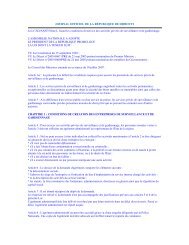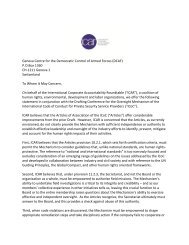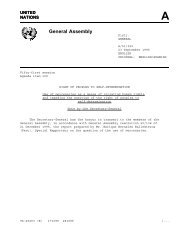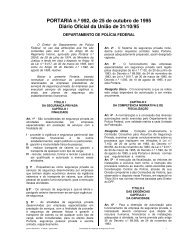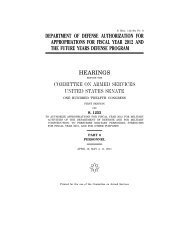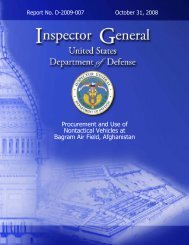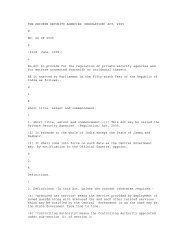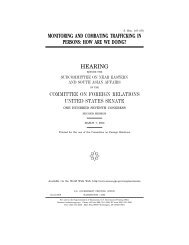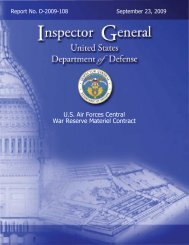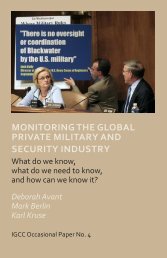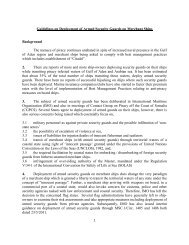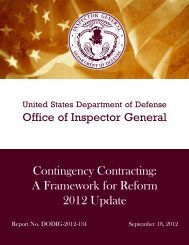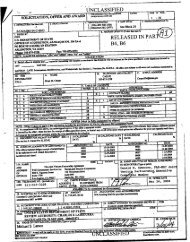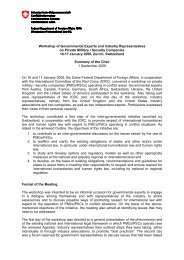A Framework for Regulation - Private Security Monitor
A Framework for Regulation - Private Security Monitor
A Framework for Regulation - Private Security Monitor
- No tags were found...
You also want an ePaper? Increase the reach of your titles
YUMPU automatically turns print PDFs into web optimized ePapers that Google loves.
2 PRIVATE MILITARY AND SECURITY COMPANIESsociety regulatory ef<strong>for</strong>ts. It outlines thegovernance structure, financing, barriers todevelopment, and added value of each. And itsuggests that it may be necessary to combinedifferent blueprints to construct one overalleffective framework. A final section sets out thesteps that stakeholders need to take in order torealize such a comprehensive global framework <strong>for</strong>the GSI on the basis of these blueprints.IntroductionIn the last decade, commercially organized securitypersonnel have become an increasingly commonsight around the world, from protecting shoppingmalls in the American Midwest to providingconvoy security in the Middle East. They are theincreasingly visible side of an industry that providesa wide range of services related to the provision,training, coordination, and direction of securitypersonnel, and re<strong>for</strong>m of their institutions.In many cases, small local subcontractors andlarge multinational companies are connectedthrough subcontracting arrangements, jointventures, personnel movements, and subsidiarystructures. Together, they <strong>for</strong>m a complex web ofcommercial providers of guarding and protectionservices; operational support in combat, intelligence,interrogation, and prisoner detentionservices; and advice to, training of, and re<strong>for</strong>m oflocal <strong>for</strong>ces and security personnel. They <strong>for</strong>m, inother words, a global security industry.The global security industry (GSI) has undergoneparticularly dramatic growth following the US-ledmilitary campaigns in Iraq and Afghanistan. In theensuing years, it has received particular attentionregarding its perceived lack of respect <strong>for</strong> humanrights and international humanitarian law (IHL), aswell as labor rights and other standards relating tocorporate responsibility. Evidence of industryviolations of these standards remains partial,disputed, and problematic. However, the persistenceand plausibility of such allegations has notbeen effectively matched by improved regulationand accountability, either on the part of states,which bear the primary duty of regulation, or fromother stakeholders in the GSI. Indeed, existingregulation of the industry has received widespreadcriticism <strong>for</strong> a lack of transparency and—in particular—alack of appropriate accountability <strong>for</strong>violations of human rights and IHL by PMSCpersonnel.These criticisms get to the heart of the regulatoryproblem: the lack of industry-wide standards toprotect human rights and ensure respect <strong>for</strong> IHL,and effective arrangements <strong>for</strong> their implementationand en<strong>for</strong>cement. Collaborative regulatoryaction is clearly needed to secure the future of theindustry—or at least to secure the human rights ofthose it affects—so long as the industry continuesto thrive in a free market. And such collaborativeregulatory action is clearly in the interests of notonly those affected by the conduct of the industry,but those with financial, political, or personalstakes in it.This report’s call to improve the implementationand en<strong>for</strong>cement of human rights and IHL, as wellas other standards in the global security industry,should there<strong>for</strong>e be understood not only as one partof a larger ef<strong>for</strong>t to mitigate the risk of furtherhuman rights violations by PMSCs, but also as anattempt to harness the potentially positive contributionto security, development, good governance,and even the enjoyment of human rights, that suchan industry—if effectively regulated—has thecapacity to offer.As demonstrated below, national regulation,company codes, intergovernmental ef<strong>for</strong>ts, andcivil society initiatives have all, so far, fallen short inremedying these failings. And reliance on the“invisible hand” of market <strong>for</strong>ces to achieveeffective regulation does not seem to have protectedall stakeholders’ interests. Among others, the UNSpecial Representative on Business and HumanRights, Professor John Ruggie, has pointed to theneed <strong>for</strong> the general lessons of “business andhuman rights” to be applied in considering thespecific question of how to improve the regulationof PMSCs, including through international andmultistakeholder arrangements. 2 We need to gobeyond unilateral state regulation and beyondmarket <strong>for</strong>ces.This report argues <strong>for</strong> a global framework toidentify, implement, and en<strong>for</strong>ce relevantstandards across the industry, assisting states to2 United Nations Secretary-General, Business and Human Rights: Mapping International Standards of Responsibility and Accountability <strong>for</strong> Corporate Acts, UN Doc.A/HRC/4/035, February 9, 2007, p. 18.



